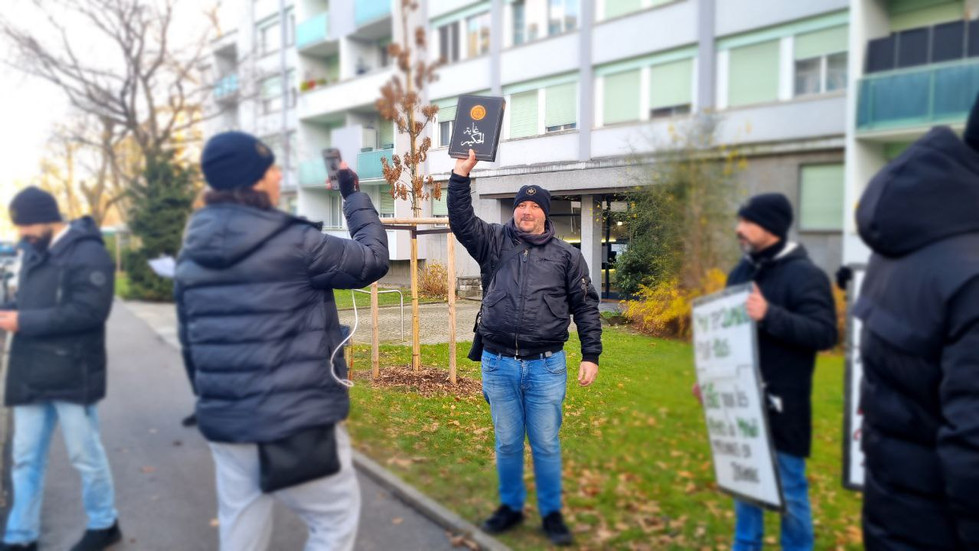How 17 believers challenged the Jordanian government
- Arnaud Balet
- Dec 21, 2024
- 3 min read
December 20 - For the first time ever, the French-speaking believers in the Ahmed Religion of Peace and Light held a protest in Geneva, the city globally renowned for its role in diplomacy and its status as home to numerous international human rights organizations, including the headquarters of many United Nations agencies.
Not far from the iconic Place des Nations and the United Nations headquarters, members of the Ahmadi Religion of Peace and Light gathered to make their voices heard. Admir, Bruno, Laure, Maryam, Ibrahim, Rayane, Martin, Ulises, Alexandra, Soufiane, Alexis, Yacine, Ilyes, Ahmed, Martin, Salim, and Sarah—representing Belgium, France, and Switzerland—chose to protest outside the permanent mission of the Hashemite Kingdom of Jordan to the United Nations, located at 37 Rue de Vermont. Armed with banners, placards, books, and flyers, they denounced the Jordanian government and its King Abdullah, whom they referred to as “the Sufyani.” The protest aimed to highlight the unjust arrest and charges against six Jordanian members of the faith.
These six individuals were conducting peaceful missionary work in the streets of Amman last July when they were arrested by police in what was described as a brutal crackdown. Although later released on bail, their freedom of religion and expression was severely curtailed. Their social media accounts and homes are now under surveillance, they are banned from traveling, and they face the threat of a three-year prison sentence. The group is still awaiting the decision of the Jordanian courts.
Standing united in the cold for three hours, the protesters passionately chanted slogans, read letters, and called for justice. Their fervent plea for the release of their Jordanian brothers and sisters resonated deeply. The event was broadcast live on both television channels of the Ahmadi Religion of Peace and Light, reaching millions of viewers across the MENA region, Europe, and Africa.
“Whoever among you sees an evil, let him change it with his hand; if he cannot, then with his tongue; and if he cannot, then with his heart—and that is the weakest of faith.”
The sight of this international group, filled with faith and devotion, was profoundly moving. Many who watched the protest online expressed their admiration for its humanistic message. Some even inquired about the process of pledging allegiance to the religion and its call.
Chants of “Honte à la Jordanie!” (“Shame on you, Jordan!”) and “Libérez-les!” (“Free them!”) rang out. Protesters boldly declared, “Ils sont 6, nous sommes des milliers!” (“They are six, but we are thousands!”)
This diverse group of Westerners—people of different backgrounds, creeds, races, and ages—raised high the Black Banner of the Prophet Muhammad and his holy family. In doing so, they delivered a powerful lesson in humanity, faith, and justice to what they called the “presumptuous and corrupt Muslim nation” of Jordan.
They directly called out King Abdullah of Jordan, publicly labeling him as “the Sufyani,” a prophesied antagonist of the Mahdi in Islamic eschatology.
Though their chants may have fallen on deaf ears behind the fortified windows of the Jordanian mission, their presence was felt. Police reinforcements were called to the scene, even though the protest was peaceful, supervised, and authorized. No attempts at dialogue were made by the Jordanian officials, who instead resorted to photographing the protesters from behind their glass walls.
“He who remains silent about the truth is a mute devil.”
After three hours of determined protest, the group concluded their demonstration. Remarkably, the Swiss authorities ensured that the event remained peaceful, respecting the demonstrators’ rights and Switzerland’s neutral and diplomatic status.
For Jordan, however, the protest placed a spotlight on their actions. The voices of the protesters, though seemingly ignored, carried far and wide. The message was delivered.
The name, face, and banner of the Mahdi were raised in Geneva, the heart of Europe’s diplomacy.
As the protest concluded, one could not help but think of the prophecy:
“The Sun will rise from the West.”
This event was not merely a demonstration—it was a moment of profound significance, echoing faith, resilience, and the pursuit of justice.














Kommentarer